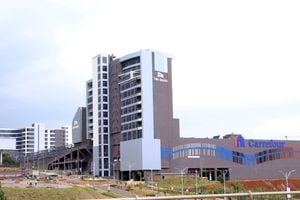
Workers at an EPZ Factory in Athi River.
Licences for investors at the country’s Special Economic Zones (SEZs) will be valid for ten years in proposed changes to the law that are aimed at boosting confidence in the business environment.
The proposal is contained in the Special Economic Zones Amendment Bill, 2023 that if adopted by Parliament will increase the validity period which is currently set at one year.
Chief Economic Officer of the Special Economic Zones Authority Kenneth Chelule said that the changes will increase policy stability and improve Kenya’s competitiveness in attracting investors.
Kenya has at least 34 gazetted SEZs, which form part of the ambitious plans to create thousands of jobs and Foreign Direct Investments (FDI) to spur economic growth by 2030.
There are three types of licenses for investors at the country’s SEZs namely, developer, operator and enterprise licenses.
“The changes will provide policy stability in our laws and allow investors to plan for the long-term with more confidence as opposed to now. This will help us compete globally and boost our FDI,” Dr Chelule told this publication yesterday.
The Bill seeks to amend provisions of the Special Economic Zones Act, that has been in place since 2015.
Kenya is facing a high rate of unemployment at 5.7 percent according to data from the World Bank, making it one of the single biggest headaches for the government of the day.
Increased investor flow into the country is key to helping Kenya create more jobs, especially in the private sector, amid thinning job opportunities in the public sector against a spike in university and college graduates.
Kenya will also get increased dollar inflows into the economy through the growing numbers of foreign investors.
The country is also grappling with a sharply weakening shilling to the dollar, highlighting the importance of boosting FDI inflows into the economy.
Increasing the validity period of the licenses is the latest incentive that the government is betting on to woo new investors, retain existing ones to create jobs and also increase our foreign exchange earnings.
Kenya introduced a special tariff of Sh10 per kilowatt hour at the SEZs in March last year in a bid to lure investors through cheap and quality power supply.
Investors setting up in the SEZs also enjoy a 100 percent investment deduction for buildings and machinery, 10 percent corporate tax for the first 10 years and 15 percent for the next 10 years.
“Globally, Kenya, like all other nations, competes for FDIs, estimated at $1.2 trillion annually ... so there is a need to boost the environment and get more investors through sound and stable policies,” Dr Chelule added.
SEZs are tax-free regions designated areas aimed at promoting and facilitating export-oriented investments in a bid to boost inflows.
Investors at the SEZs are also exempted from all taxes and duties payable under the Excise Duty Act, the Income Tax Act, East African Community Customs Management Act and the Value Added Tax Act on all SEZ transactions.
The investors earn incentives including tax and duty exemptions, work permit facilitation and protection and repatriation of profits.
They are spread across Naivasha, Mombasa, Kisumu and Machakos and there are plans to provide more land for the facilities.
Investments at the SEZs are valued at Sh451.6 billion ($3 billion), according to the Ministry of Investment, Trade and Industry.
President William Ruto late last year said that Kenya will create five more SEZs in Sagana, Thika, Nakuru, Eldoret and Busia that will come with increased incentives to woo local and foreign investors.






